Maersk and CMA-CGM: The favorite shipping companies of the Colombian mafia

Leaked documents from the Prosecutor’s Office show that their vessels, the initials of their containers and the arrival docks of these companies in Europe are mentioned by criminals to speak in code about cocaine shipments and routes.
With 72 thousand and 48 thousand kilos of drugs seized in their ships and containers, respectively, the European giants are the most used by organized crime. Together they account for almost half of the seized alkaloid linked to international maritime traffic in the country between 2016 and April 2022. This was identified by Cuestión Pública and OCCRP after the construction of a unique database that consolidated and cross-referenced information from four official sources in Colombia and one in Belgium.
During one year, this journalistic alliance tracked 431 seizures of 265 tons of cocaine, almost double the weight of the Statue of Liberty. There he found that these shipping companies also lead in the number of seizures: Maersk appears in 134 cases, followed by CMA-CGM with 67.
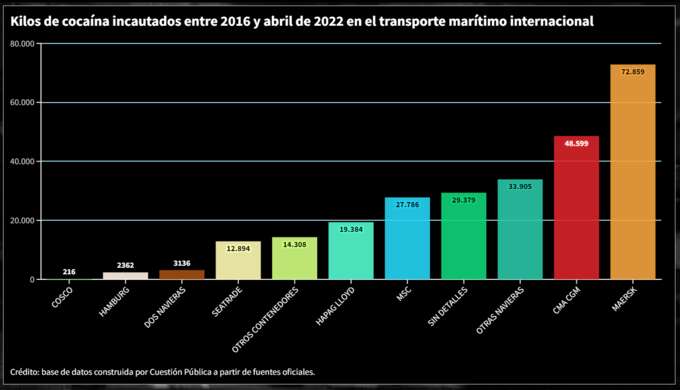
Contamination with narcotics on its transportation line was so recurrent that almost every month from 2016 until April 2022, a shipment fell on one of these two shipping companies, which are part of the five most important maritime companies in the world.
The seizure figures contrast, to a large extent, with the participation of the two multinationals in the Colombian market: between 2016 and 2021, the Danish Maersk had 33% and the French CMA-CGM, 11%, according to data from Sicex, a market intelligence platform.
Through an extensive leak of emails from the Colombian Prosecutor’s Office, this alliance found documents of interceptions and testimonies of members of criminal organizations, who ask both explicitly and “in code” to use the services of both to export drugs.
In January 2022, an informant from the Prosecutor’s Office, who previously provided his services as a diver for a mafia cartel in the Colombian Caribbean, explained that the organization of which he was a member required that cargoes leaving from Barranquilla and other cities arrive at the terminals. of Maersk in Europe.
In January 2022, an informant from the Prosecutor’s Office, who previously provided his services as a diver for a mafia cartel in the Colombian Caribbean, explained that the organization of which he was a member required that cargoes leaving from Barranquilla and other cities arrive at the terminals. of Maersk in Europe.
“There are people who are looking to send 30 or 40 kilos of cocaine to the port of Antwerp, Belgium, exactly to terminal 188 and 234, where containers with Maersk Line bananas arrive. They [the European partners] want the merchandise to go in the eyes of the ship, that is, in the motors of the air conditioners or in the mirror, which is the bottom part of the container, because in those places between 40 to 100 can fit. kilos of cocaine.” This testimony was recorded in a technical report from the control entity.
Adaptation of contamination of the Clifford Maersk ship with cocaine with the modality of divers. Credit: Public Issue Team.
Pier 188 reported three seizures totaling 1,580 kilos of cocaine in 2019, according to information provided by Belgian authorities to Cuestión Pública and OCCRP . Two of them arrived in shipments of bananas and were carried out on Maersk ships.
Terminals 188 and 234 of the port of Antwerp are also the favorites of another criminal group based in Santa Marta, according to documents from the Prosecutor’s Office. In 2021, the authorities obtained the information through legal telephone interceptions made to said structure, whose drugs were produced in Norte de Santander.
Some of its members, known by the aliases Juancho, Joche and Alex, referred in code to cocaine exports through the use of two of the acronyms that identify Maersk containers globally: MMAU and MNBU . These prefixes are registered as property of the company with the Bureau of International Containers (BIC).
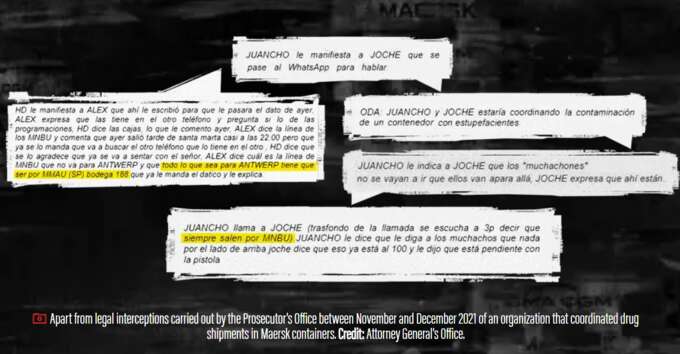
In one of those calls, Alex indicates that “(...) everything that is through Antwerp [Antwerp] has to be through MMAU (SP) warehouse 188 ” and that those who pay for drug shipments “do not want 1700 [ another warehouse in the port, where CMA-CGM ships arrive], they want the 234 [from Maersk].” In another conversation, someone interrupts a conversation between Joche and Juancho to affirm that the shipments “always leave through MNBU.”
On August 30, 2018, a shipment of bananas from the companies CI Coindex SA and Bensa Global Trading was seized at dock 188 of the port of Antwerp with 3.4 tons of cocaine. The drugs were in container MNBU 031563-4, on the Maersk ship Cap Beatrice.
Of the 53,481 kilos of cocaine seized in containers of the Danish shipping company since 2016, those identified with those two acronyms correspond to more than half of the total drugs seized (58%) : 10,154 in MMAU and nearly 21 thousand kilos in MNBU, according to the database built by Cuestión Pública.
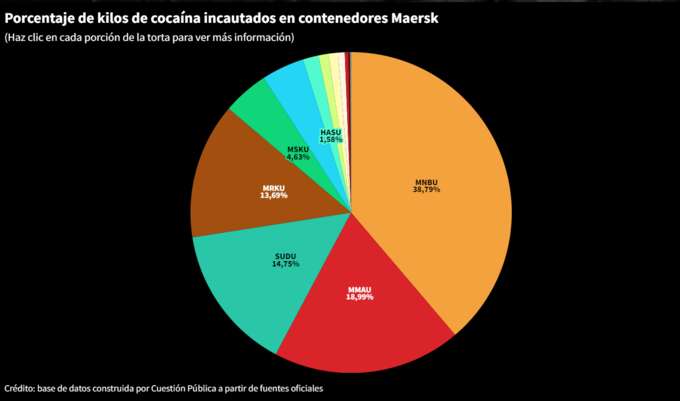
In other countries, suspicions about the shipping company’s preference for drug traffickers to export drugs are of such magnitude that, as revealed by the Danish newspaper Finans , "Maersk" and "cocaine" are among the words chosen by the Dutch police to access encrypted conversations between criminals on the Sky ECC messaging service.
In Costa Rica, the former Minister of Security, Álvaro Ramos, told this journalistic alliance that after the award in 2011 of the concession of the sea port of Moín to APM Terminals, a company of the Maersk group , they noticed a significant increase in drug trafficking.
“With the arrival of [APM in Puerto Moín] a very high possibility was given to large international drug trafficking to use the port facility and a very large expansion was noted towards Western Europe and a little towards the United States. "We began to receive reports that [narcotics] were arriving from that port to Rotterdam, Seville and other ports in Europe."
Asked about former Minister Ramos’ statement, Maersk noted that "at that port, APM Terminals has systematically followed the instructions of local authorities, and we have installed three container scanners for local security forces to operate, and we continue to support efforts where we are required.”
To reach these findings, data from different sources of information were cross-referenced: Prosecutor’s Office, Navy, Ministry of Defense and Police of Colombia, Belgian authorities, export bases such as Panjiva and ImportGenius, and records in national and international media.
The cases were established based on the amount of drugs, the place and date of seizure, which revealed inconsistencies in the records kept by the different Colombian authorities and seizures that were not reported.
After this search, 22 facts were found in confidential documents of the Prosecutor’s Office that were not reported by any other national authority. They were not even listed by the same control entity in an official response that it delivered to these media.
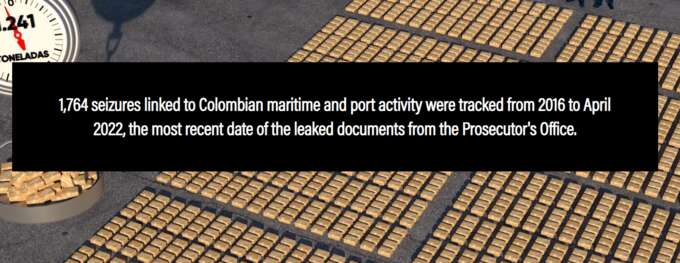

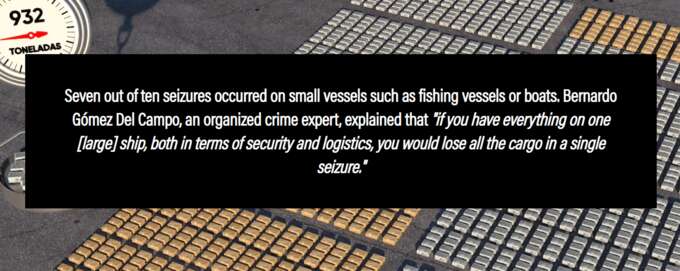


"MY CUSTOMER ONLY ACCEPTS
CMA LIKESHIPPING COMPANY"
On June 14, 2020, in the midst of the Covid-19 outbreak, 2,500 kilos of cocaine were seized in Cartagena, according to a report from the Prosecutor’s Office. The drug was hidden in bundles of pulverized panela in the container CMAU 634975-6 of the French shipping company CMA-CGM, which was going to be loaded onto the motor ship Cristina Star, of the same company. However, due to capacity problems, the container ended up leaving aboard the Dublin Express ship, owned by Hapag-Lloyd.
The merchandise had been exported by the Colombian company Serendipia Group and the importer was Zurkum Business, registered in the Spanish city of Valencia and represented by the Venezuelan José Alejandro Sierra Troncoso, alias “Chepe”, leader of the criminal organization in Europe. Although Sierra pointed out that his company worked for the Carrefour supermarket chain, documents from the Prosecutor’s Office on this case concluded that it was actually a front company created to facilitate drug trafficking.
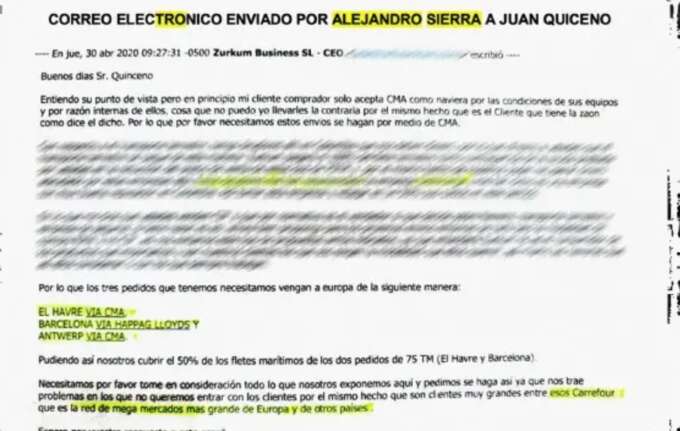
Communication between members of the criminal group identified as Perlas Negras, obtained by the Prosecutor’s Office, in which they coordinated drug shipments involving CMA containers. Credit: Attorney General’s Office.
The drugs had to be transported on this shipping company, as explained by Sierra Troncoso, in an email sent to his Colombian partner, Juan Sebastián Quiceno Calderón, legal representative of Serendipia Group. Both coordinated several shipments, among them, the two tons of cocaine that fell in Cartagena, where the ship was transiting before leaving for the port of Le Havre, in France, its landing place.
“In principle, my buyer client only accepts CMA as a shipping company , due to the conditions of their equipment and for their internal reasons, which I cannot contradict them due to the same fact that it is the Client who has the zaon [right] as they say. the said. So please we need these shipments to be made through CMA (sic).”
A month before that email and after successfully receiving two loads of pulverized panela mixed with cocaine in Valencia in March, according to the Colombian Prosecutor’s Office, alias Chepe asked the owners of Serendipia that “the next containers be sent in larger sizes, that is, 40 feet, with the pretext that the merchandise would have better ventilation.”
PHOTOGRAPHIC RECORD OF THE SEIZURE IN BELGIUM





Images of the seizure of almost two tons of cocaine in organic fertilizer on November 26, 2019. Credit: Attorney General’s Office.
The CMA container in which the two tons of cocaine were confiscated was 40 feet. A possible explanation for why the criminal group preferred these sizes to send the drugs was provided in the judicial report by the field investigator, whose name was reserved for security.
“According to my knowledge and the type of contamination used by the criminal organization, the request to increase the size of the container would be due to the ease they would have for unpacking the merchandise at the time of contamination with a narcotic substance in transit.” , noted the researcher.
In 2023, the Prosecutor’s Office dismantled this transnational criminal organization identified as “Black Pearls” that operated in Buenaventura and Valencia, Spain, and that unsuccessfully tried to export six tons of cocaine to Europe between 2019 and 2020. Although six of the members of This group was captured in Spain in 2021, the criminal process was provisionally dismissed, that is, closed due to lack of evidence, since February 2022, as indicated to this alliance by the Court of Instruction 16 of Valencia.
THE PATTERNS FROM COCAINE
The drugs seized in CMA-CGM come from the Colombian Pacific, according to data compiled by this journalistic alliance. One of every five seizures involving the shipping company’s ships and containers occurred in Buenaventura, the most important port in the region.
Far from that city, on the other coast of the country, and unrelated, another organization identified as Perla Negra, in singular, and at the service of the Gulf Clan in the Caribbean, sent nearly 15 tons to the old continent between 2017 and 2018, using Maersk as shipping company.
This group trafficked 7.5 out of every 10 kilos of the alkaloid, mainly from the Port of Santa Marta. Almost half (47%) of the seizures on ships and containers of the Danish company occurred in that port company.
The Gulf Clan has had great influence there for several years, according to a researcher from the International Center for Research and Analysis against International Maritime Drug Trafficking (CMCON), who spoke with Cuestión Pública and OCCRP under anonymity.
This was confirmed by Vice Admiral Orlando Grisales Franceschi, Chief of the Naval Operations Staff of the Colombian National Navy, to this alliance:
“The seaports of Santa Marta are a key point for the export of cocaine to European ports, which is mostly hidden in containerized cargo of fruit such as bananas and pineapple. On the other hand, the infiltration of criminal organizations in ports and local authorities allows drug trafficking to operate with relative impunity.”
According to the data collected during this investigation, Belgium has remained the favorite country for the entry of drugs into Europe, as it has recorded 26 cases of cocaine seized from Colombia since 2016, for a total of 27 tons in the port of Antwerp.
In this port, criminal organizations know in detail the exact docks where each shipping company’s ships dock. In addition to 188 and 234, where Maersk arrives, this alliance found references by criminal groups to dock 1700, assigned to CMA-CGM, in documents from the Prosecutor’s Office. In 2019, according to data from the Belgian authorities, three ships contaminated with 2,701 kilos of cocaine were disembarked at this last dock, of which two were from CMA-CGM.

 Apart from legal interceptions carried out by the Prosecutor’s Office to different criminal organizations. Credit: Attorney General’s Office.
Apart from legal interceptions carried out by the Prosecutor’s Office to different criminal organizations. Credit: Attorney General’s Office.
Drug traffickers also show a certain preference for products or companies when carrying out contaminations. According to the database built in this investigation, the record for drug seizures is held by Banasan , one of the largest banana exporters in the country. The company is linked to 37 seizures totaling 4.7 tons of cocaine in Colombia, Germany and Belgium between 2016 and 2022. All occurred on Maersk ships or containers.
Armando Lacouture, lawyer and spokesperson for the exporter, pointed out that "Banasan is the main victim of this criminal activity" and that it is "an insignificant figure compared to the 13 thousand containers that it exports per year to Europe" , its only destination. He added that they have a money laundering policy, GPS tracking of the trucks where the fruit is transported, among other controls.
For Henrik Vigh, professor at the University of Copenhagen and expert in organized crime, "narcos focus on port terminals, where the pace is high, to be able to send their goods quickly. This especially affects the docks that handle food. In "These, it is difficult for authorities to stop the flow of containers if they suspect smuggling, because the food rots and there is a risk of interrupting the transport chain."
The lawyer added that until now there have been no investigations against Banasan executives for drug trafficking and clarified that the shipping company is chosen by international clients who buy cargo from them.
Adaptation of contamination of the Maersk Cap San Tainaro ship with cocaine with the climbing modality. Credit: Public Issue Team.
According to documents from the Prosecutor’s Office, the choice of the shipping company seems to be in charge of European drug traffickers, in charge of collecting the drugs at the ports of arrival. Legal interceptions made by the control entity show that this practice is followed by criminal organizations that operate in Buenaventura and Barranquilla, and that once the place of arrival is known, the logistics of shipping the cocaine begin to be coordinated.
SOLUTIONSLOGISTICS
TO MEASURE
In recent years, shipping companies such as Maersk and CMA-CGM have opted to diversify their business portfolio towards the entire logistics chain of international trade: from the collection of cargo in the warehouse of origin, the customs agency service, transportation in their containers and shipping on their ships, until delivery at the destination.
Professor Henrik Vigh commented that a business model like Maersk’s “adapts perfectly to drug traffickers, who prefer there to be as few links as possible in the chain. The fewer times goods have to change hands, the lower the risk of being monitored and discovered. Introducing them into a company that covers the entire logistics chain is a clear advantage for you as a cartel.”
Although the main shipping companies offer similar services, the case of Maersk is exceptional. Through its subsidiary APM Terminals, it has a majority stake in the Buenaventura Container Terminal Port Society (TCBuen) and in other terminals in Costa Rica, Brazil and Panama . In addition, it has logistics operators such as Maersk Logistics and Servicios Colombia, customs services in Europe such as KGH (now Maersk Customs Services), and one of the largest container and vessel networks in the world.
90% de la cocaína incautada en el mundo es transportada por vía marítima*
Número de incautaciones de cocaína en el tráfico marítimo internacional provenientes de Colombia, entre 2016 y abril de 2022
(Haz clic en los círculos verdes para ver más información)

Crédito: base de datos construida por Cuestión Pública a partir de fuentes oficiales
*Fuente: Ministerio de Defensa, diciembre de 2023. Presentación de resultados de la Operación Orión contra el narcotráfico internacional.
When consulted about this alliance, the Danish multinational pointed out that the large number of seizures in its containers and vessels is usually the result of good and proactive collaboration between the authorities and the sector. It added that it uses container scanners at its highest-risk terminals and is exploring the use of container tracking devices, as well as the use of artificial intelligence for suspicious shipments.
Jan Janse, district chief of the Port Police of Rotterdam, Netherlands, noted that while "all the shipping companies we know are not criminally involved in drug trafficking, (...) I dare say that each one has people corrupt working for them.
Interview with Jan Jensen , district chief of the Port Police of Rotterdam, Netherlands. Questioned by journalist Pavla Holcova from the Czech media Investigace, for NarcoFiles.
In 2023, executives from MSC, Maersk, CMA-CGM, Hapag-Lloyd and Seatrade signed a declaration on the fight against transnational drug trafficking with the Belgian and Dutch governments. Among the commitments was to exchange information and implement improvements in the background checks of its personnel.
However, neither the shipping company, nor the crew members of the vessels, nor the companies that serve as camouflage for drug traffickers are the subject of investigations by the authorities in most cases, according to judicial documents obtained by Public Issues and OCCRP.
Juan Alberto Páez, executive director of the National Association of Shipowners and Maritime Agents (ASONAV), told this alliance that "maritime companies are victims of drug trafficking (...) The statistics [of tons of drugs seized in shipping companies] could demonstrate an active commitment to collaboration with the authorities".
For its part, the French shipping company responded to this alliance that “the fight against all types of illicit trafficking is an absolute priority for the CMA-CGM Group, as well as for the entire shipping industry.” He assured that he collaborates closely with the police, customs and judicial authorities of all countries to combat this type of trafficking and that for the safety of his team and his operation "he does not make any further comments on the matter."
Until now, there is no known country that has openly analyzed the role of shipping companies in the fight against drug trafficking. The United States did so on only one occasion with the Gayane ship of the MSC shipping company, on which 19 tons of drugs Rosa Ana Morán , have drawn attention to the role of transporters.
Professor Henrik Vigh explained that “if you intervene and restrict the free movement of goods, you run the risk of quickly creating problems in the supply chain. If, for example, ships and containers begin to be controlled more intensely or ports are regulated excessively, there is a risk of slowing down world trade.”
“Now we have a generation of criminal entrepreneurs who work with legal merchandise, but also illicit”: Bernardo Gómez del Campo
The Colombian expert from CMCON, which brings together 12 countries and is in charge of studying interoceanic drug trafficking, admitted to this alliance that the team studies 200 different variables such as the illicit substance, the criminal group or the type of contamination, but It does not include the companies that own the vessels and containers subject to alleged contamination.
And, according to Mexican Bernardo Gómez Del Campo, the most serious problem in the persecution of drug trafficking is the “outdated” view of the challenges: “now we have a generation of criminal businessmen who work with legal merchandise, but also illicit. The difference is that they do it as trained businessmen and what is failing is the corporate criminal investigation of the shipping companies.”
Read more similar news:
Comments:
comments powered by Disqus

































